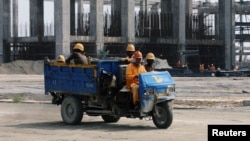Nigeria has been Africa’s largest or second-largest oil exporter for years, but relies heavily on imports to meet local energy needs. The government is trying to change that, saying the country’s four moribund oil refineries will be revived and put back in operation.
This week, authorities also announced a new policy that oil producers must sell a share of their crude oil to local refiners before they are permitted to export crude.
Nigeria’s petroleum regulatory commission announced the new Domestic Crude Oil Supply Obligation (DCSO) during a meeting with industry players. It's part of an amendment to Nigeria’s Petroleum Industry Act of 2021.
Under the policy, Nigerian oil producers are allowed to export crude only after meeting their supply obligations to local refiners.
The measure will take effect in the second half of the year, but it does not specify what quantity of crude must be supplied to local refineries.
Authorities said the objectives of the guideline are to bolster Nigeria’s refining capacity, improve the oil industry and earn foreign exchange.
Public affairs analyst Jaye Gaskiya said it was the right move. "In the current situation globally, this is actually going to turn out much more beneficial to both the producers and refiners in the country," Gaskiya said. "Essentially this is designed to ease the problem of supply to the local refineries so that they don't become redundant. The second thing is that it is also designed in such a manner to ease the pressure on the naira," which is the currency of Nigeria.
According to the regulations, payments for crude to domestic refiners can be made in dollars, naira or a combination of both.
Nigeria relies heavily on imports to meet the population’s energy needs. Analysts say refining crude oil locally could reverse this trend.
But oil and gas analyst Toyin Akinosho said he had concerns.
"In principle, I do not have a problem with it, but we need to be very careful about the foreign exchange implications and also the volumes that are going out," he said. "My challenge has always been, if you are overzealous about certain regulations, you can burn your fingers. In an era of very low forex [currency trading] and this being the major avenue for inflow into the country, you have to find a way of managing it."
The new measure includes penalties for oil producers who divert crude oil or refiners who fail to meet payment obligations.
But Gaskiya said there were some loose strings to the rule.
"The regulation says it is on the basis of willing buyer and willing seller, and that's quite tricky," Gaskiya said. "A situation where you have the suppliers, for instance, being unwilling, what are you then going to do as the regulator? So those are the things that the regulator needs to be on the lookout for."
The refineries in Nigeria, including the latest one built by Africa's richest man, Aliko Dangote, will have a combined processing capacity of 650,000 barrels of crude oil per day when rehabilitated.
While experts have doubts the new guidelines will be effective, authorities are optimistic Nigeria is getting closer to its goal of having a self-sufficient energy sector.




